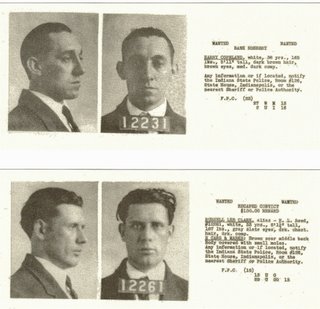Here's my latest obsession about the Midwest crime wave during the 1930's: Did Russel Clark actually participate in freeing John Dillinger from the Lima Jail and the subsequent killing of Sheriff Jess Sarber? Here's a look at both of these men:
 I'm sure that if I were to see these two close up I could clearly tell them apart; however, no one ever got a close up view of the third person involved in the escape attempt. Initial reports listed Harry Pierpont, Charles Makley, and Harry Copeland as the perpetrators. Copeland is listed in all news articles and in the Bureau of Investigation (FBI) reports. It isn't until the the "terror gang" is captured in Tuscon, AZ several months later that Russel Clark is identified as involved.
I'm sure that if I were to see these two close up I could clearly tell them apart; however, no one ever got a close up view of the third person involved in the escape attempt. Initial reports listed Harry Pierpont, Charles Makley, and Harry Copeland as the perpetrators. Copeland is listed in all news articles and in the Bureau of Investigation (FBI) reports. It isn't until the the "terror gang" is captured in Tuscon, AZ several months later that Russel Clark is identified as involved.
Now, Copeland had been sent back to Michigan City prison for violating his parole by the time Clark was named. He admitted to a number of robberies done at the time of the murder. Because this murder was definately a death penalty case being a defendent in the Sarber killing probably sounded like a much worse deal than copping to a few more robberies!
Clark on the otherhand, of course maintained his innocence (as did Pierpont and Makley), but he also acted strangely when he was recaptured. He was morose and uncharacteristicly quiet. Depressed. Now a person on trial for his life has a right to be depressed. But Clark's demeanor was commented on that he appeared in a "stupor" and only showed any signs of life when he didn't get the chair, as Pierpont and Makley did, but received a life sentence instead.
Historians typically attribute Clark's depression as deriving from his responsibility for the gangs capture in Tuscon. Firefighters were tipped off to the gangs identity after Clark and Makley tipped them a large sum to carry down heavy bags (loaded with weapons). When one of the firefighters was looking through a detective magazine and saw wanted photographs of the gang it was like "Hey! that's the guy who gave me that big tip". Well maybe that was not the cause of his depression. I think it was because he was on trial for a crime he didn't commit. Not only that, I think he was sure that he was going to get the chair. The publicity of the trial made conviction a sure thing. During the trial, potential jurors were asked if they were pro death penalty and anyone who was not was excluded. I really think Clark believed he was gonna die for nothing.